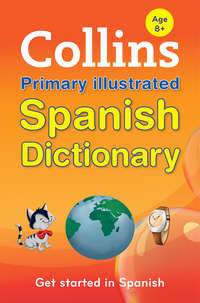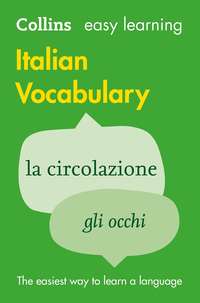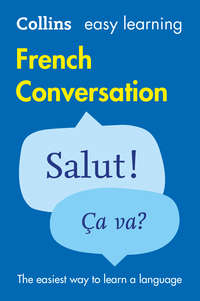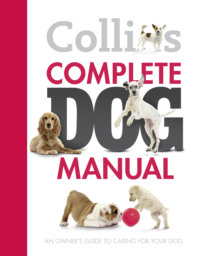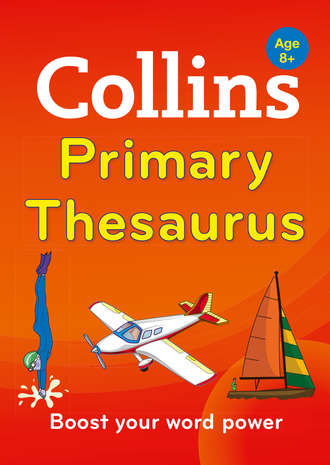
Полная версия
Collins Primary Thesaurus
apply
If you are travelling abroad, you must apply for a passport.
beg
I begged Mum to let me go to the party, but she said no.
beseech
“Have mercy on me, I beseech you!” the frog prince cried to the princess.
demand
The angry diner demanded to know what a beetle was doing in his pudding.
implore
“I implore you to think twice before running away,” said Emma.
plead
The princess pleaded to be set free by the wicked witch.
request
The soccer player requested a transfer to another club.
ask (3) VERB
If you ask someone to come or go somewhere, you invite them there.
ask someone round
The vicar asked us round for a cup of tea.
bid OLD-FASHIONED
His lordship bade me enter and enquired if I would drink wine with him.
invite
Whoopee! Della has invited me to her party.
summon
King Arthur summoned his knights to an assembly at the Round Table.
asleep ADJECTIVE
If you are asleep, your eyes are closed and your whole body is resting.
dead to the world INFORMAL
Dad was dead to the world in the armchair.
fast asleep
Jim, our dog, was fast asleep with his legs in the air.
sound asleep
I was so sound asleep that my little brother had to sit on me to wake me up.
ANTONYM: awake
➔ See sleep (1)

attack (1) VERB
If a person or an animal attacks another person or animal, they use violence in order to hurt or kill them.
assault
The muggers assaulted the man, then tried to steal his wallet.
charge
The Light Brigade charged the enemy’s guns at full tilt.
mug
Unfortunately, some people are mugged on dark city streets.
raid
Police raided the house where the escaped criminal was living.
storm
Troops stormed the cliffs and succeeded in silencing the machine guns above.
ANTONYM: defend

attack (2) NOUN
An attack is a violent, physical action against someone or something.
assault
“This was a serious assault, for which you must pay,” said the judge grimly.
charge
The Light Brigade’s charge was brave but doomed.
invasion
The 1944 D-Day landings in France formed the biggest invasion in world history.
raid
The air raids continued night after night.
strike
The missile strike destroyed the buildings.
ANTONYM: defence
automatic ADJECTIVE
An automatic machine is programmed to do a task without needing a person to operate it.
automated
The new automated answering service kept Dad waiting for half an hour.
computerized
Most photocopiers are computerized these days.
robotic
In car factories, robotic arms put most of the parts together.
self-propelling
My self-propelling model glider worked by twisting an elastic band.
avoid (1) VERB
If you avoid someone or something, you keep away from them.
dodge
We dodged our nosy neighbour by hiding behind a tree as she went past.
elude
By going out of the back door, the celebrity eluded the photographers.
evade
The criminal managed to evade the police for several days, but was eventually caught.
shun
The shy film star shunned publicity, preferring a quiet family life.
steer clear of INFORMAL
“If I were you I’d steer clear of that quarry,” my dad said sternly.
avoid (2) VERB
If you avoid doing something, you make an effort not to do it.
dodge INFORMAL
My lazy brother tried to dodge cleaning the car, but Dad made him do it.
duck out of INFORMAL
I tried to duck out of unpacking the dishwasher, with no success.
escape
The prisoner tried to escape, but the police officer stopped him.
get out of
“It’s no use trying to get out of it. You’ll have to mow the lawn,” said Dad.
shirk
The farmer tried to shirk responsibility for the pollution in the river.
away ADVERB
If you are away from somewhere, you are not in that place.
absent
With such a high temperature, Edward was forced to be absent from school.
elsewhere
I searched the house for my gran, but she was obviously elsewhere.
on holiday
Our family is going on holiday to Florida this summer.

awful ADJECTIVE
Something awful is very unpleasant or very bad.
appalling
The karaoke singer’s voice was appalling – he sounded like a dog howling!
dreadful
We had a dreadful time in Venice. All the streets were flooded.
fearful INFORMAL
Mr Bellamy had a fearful cold and sneezed all the way to London.
frightful
The house was in a frightful state after it had been burgled.
ghastly INFORMAL
Mum made a ghastly mistake, and put salt in the cake mixture instead of sugar.
gruesome
The room where the murder had taken place was a gruesome sight.
harrowing
The film was harrowing to watch.
hideous
The monster’s head was truly hideous: bloated, scarred and covered in scales.
horrendous
It was a horrendous meal, with half of the food burnt and the other half undercooked.
horrible
For one horrible moment, I thought my wallet had been stolen.
horrid
“William, that was a perfectly horrid thing to say,” said Mrs Brown.
horrific
“Unless this fog goes, I’m afraid there’ll be a horrific accident,” the police officer said.
shocking
“I think it’s shocking,” put in Dad, “that those refugees should be left without shelter.”
terrible
The sun rose on the scene of the earthquake, a terrible sight to behold.
unpleasant
Shingles is a very unpleasant disease to have.
ANTONYM: lovely
awkward (1) ADJECTIVE
If a situation is awkward, it is difficult to deal with.
delicate
It was a delicate situation: to ask Julie about her exams or not to mention the subject.
embarrassing
It was very embarrassing to be stuck outside in my pyjamas in the pouring rain!
tricky
“Now this bit could be tricky,” muttered Bond coolly. “Which wire should I cut?”
uncomfortable
The spy had an uncomfortable moment when the guards stared in through the car window.
awkward (2) ADJECTIVE
If a person or animal is awkward, they are difficult to deal with.
hard to handle
Donkeys have a reputation for being hard to handle.
stubborn
My brother can be very stubborn when it comes to helping me wash up.
troublesome
On the journey to Scotland, the car proved troublesome, but eventually we got there.
uncooperative
The lady at the enquiries desk was uncooperative and didn’t help at all.
Bb
baby NOUN
A baby is a child in the first year or two of its life.
infant
The shepherds found the infant in a stable, lying in a manger.
newborn child
The mother proudly gazed at her tiny newborn child.
toddler
Waddling on bandy legs, the toddler was off round the corner in a flash.
tot INFORMAL
“Don’t tease your brother,” said Mum. “He’s only a tot.”

back NOUN
The back of something is the part behind the front.
end
At the end of the queue, people were setting up tents for the night.
rear
I could see smoke coming from the rear of the vehicle in front.
reverse
Genevieve wrote her answers on the reverse of the worksheet.
ANTONYM: front

bad (1) ADJECTIVE
Bad things are harmful or upsetting.

appalling
The weather for our sports day was appalling.
damaging
The fumes emitted by jet aircraft can be highly damaging to the environment.
dangerous
Building sites are dangerous places which should be avoided.
distressing
Melinda found it distressing to see pictures of starving children.
dreadful
It was a dreadful shame: all Barak’s hard work disappeared as the blaze took hold.
grave
A spokesperson announced the grave news that the king was dying.
serious
The artist’s illness was too serious for him to continue painting.
terrible
Our goalkeeper was terrible today. She let in four easy shots!
ANTONYM: good
bad (2) ADJECTIVE
A bad person is naughty or unkind.

corrupt
The corrupt politician had taken money from all sorts of people.
cruel
I can’t stand people being cruel to children or animals.
disobedient
The disobedient boy ignored the warning notice and fell into the quarry.
evil
The evil villain plotted how to ensnare the handsome knight.
mischievous
Tying Kerry’s shoelaces together was a mischievous prank.
naughty
“You’re a naughty girl, Cassandra,” said her mother angrily.
wicked
The wicked witch lived alone.
ANTONYM: good

bad (3) ADJECTIVE
Bad can also mean of poor quality.

abysmal
“Such abysmal work will have to be redone,” said Mr Malone severely.
atrocious
The reporter admitted that his spelling was atrocious.
faulty
Engineers soon fixed the faulty telephone line.
inferior
The paint Dad bought was of inferior quality – it was hard to use and didn’t last long.
shoddy
Owing to shoddy workmanship, the house had to be redecorated.
unsatisfactory
The head teacher wrote that my school report was unsatisfactory.
ANTONYM: excellent
badly (1) ADVERB
If you do something badly, you do it in an inferior way.
inadequately
He had been inadequately trained for the job.
poorly
The event was poorly organized.
shoddily
This house has been shoddily built.
unsatisfactorily
I feel the whole business has been handled unsatisfactorily.
ANTONYM: well
badly (2) ADVERB
If something affects you badly, it affects you in a serious way.
deeply
I am deeply hurt by these remarks.
gravely
He was gravely ill following a heart operation.
seriously
Four people have been seriously injured.
bad-mannered ADJECTIVE
Bad-mannered people are rude and thoughtless.
disrespectful
It is disrespectful to interrupt people when they are speaking.
inconsiderate
It was inconsiderate of Meg to take a second helping when others had not had their first.
rude
We decided not to leave a tip for the rude waiter.
bad-tempered ADJECTIVE
Bad-tempered people often lose their temper.
grumpy
Dad is always cheerful in the mornings. It’s me that is grumpy.
irritable
Some people get irritable when you read over their shoulder.
moody
When people are moody, you never quite know how they will greet you.
quarrelsome
The two quarrelsome brothers were always looking for a fight.
sulky
“If you’re going to be sulky, miss, you can go to your room,” Dad replied.
sullen
The sullen waiter snatched my plate and stalked off to the kitchen.
bag NOUN
A bag is a container for carrying things in.
Some types of bag:
backpack
briefcase
carrier bag
duffel bag
handbag
holdall
rucksack
sack
satchel
shopping bag
shoulder bag
suitcase
ban VERB
If you ban something, you forbid it to be done.
make illegal
The government proposes to make illegal the sale of imitation guns.
prohibit
Using all sorts of barricades, the landowner prohibited walkers from crossing his land.
bang (1) NOUN
A bang is a hard, painful bump against something.
blow
Kirstin suffered a blow to her head when the door opened suddenly.
knock
When I slipped on the stairs, I got a sharp knock on my funny bone.
bang (2) NOUN
A bang is a sudden, short, loud noise.
blast
The blast echoed round the quarry.
thud
With a thud, the encyclopedia hit the floor.
bare (1) ADJECTIVE
If your body is bare, it is not covered by any clothing.
in your birthday suit INFORMAL
I dreamt I was walking down the high street in my birthday suit.
naked
Lady Godiva rode naked on a horse through the middle of town.
nude
For many centuries, the nude body has been a popular subject for artists.
undressed
The nurse asked me to get undressed, ready for the medical examination.
without a stitch on INFORMAL
“And there I was, without a stitch on,” Mrs Lee, our neighbour, told me.
bare (2) ADJECTIVE
If something is bare, it is not covered with anything.
barren
The Grand Canyon, although magnificent, is a barren wilderness.
bleak
The Brontë sisters lived on the edge of a bleak, windswept moor.
desolate
The abandoned town was desolate.
➔ See empty (1)
barrier NOUN
A barrier is a fence or wall that prevents people or animals getting from one area to another.
barricade
The protesters erected a barricade across the main street.
obstacle
There are lots of obstacles to get over and under in an obstacle race.
obstruction
The roadworks were an obstruction and drivers had to be diverted around them.
base (1) NOUN
The base is the lowest part of something.
bottom
The lost cat mewed at the bottom of the well.
foot
“Please would you stand on the foot of my ladder to stop it slipping?” Dad asked.
foundation
The foundations of New York’s skyscrapers rest on solid rock.
base (2) NOUN
A base is the headquarters of an organization.
centre
A humble office in a run-down district was the unlikely centre of a huge corporation.
headquarters
We arranged to meet at our scout headquarters at four o’clock.
HQ
“HQ calling Tank 5,” the colonel snapped.
bat NOUN
A bat is a specially shaped piece of wood with a handle, used for hitting a ball in some games.
You play with…
a bat in baseball, cricket, rounders, softball and table tennis.
a club in golf.
a cue in pool and snooker.
a racket in badminton, squash and tennis.
a stick in hockey.
battle NOUN
A battle is a fight between armed forces, or a struggle between two people or groups with different aims.
action
It was the first time that the young soldier had seen action.
conflict
There was a conflict of opinions: the red party on one side, the greens on the other.
struggle
The struggle for power between the king and the government was a long one.
beach NOUN
The beach is an area of sand or pebbles beside the sea.
sands
The lifeguards sprinted down the sands and plunged into the waves.
seashore
After the tanker disaster, much of the seashore was coated in an oily sludge.
seaside
Aaron loved to spend his holidays at the seaside.
shore
We walked along the shore, looking for attractive shells.
water’s edge
The water’s edge was a seething mass of turtles.
beat (1) VERB
If someone or something beats someone or something else, they hit them hard and repeatedly.
batter
The burglar had battered down the door.
flog
In Nelson’s day, sailors who stole would be flogged with a whip called a cat-o’-nine-tails.
pound
Waves pounded the shore as the wind rose to screaming pitch.
thrash
The bully threatened, “Tom Brown, I shall thrash the living daylights out of you.”
beat (2) VERB
If you beat someone in a race or game, you defeat them or do better than them.
conquer
William, Duke of Normandy, conquered England in 1066.
lick INFORMAL
Abdel really licked me in the 100 metres sprint race.
run rings round INFORMAL
Our speedy attackers ran rings round their lumbering defenders.
thrash INFORMAL
“It’s a safe bet that we’ll get thrashed when we play you,” said Tim.
wipe the floor with INFORMAL
Our school team wiped the floor with kids much bigger than they were.
beautiful ADJECTIVE
You say someone or something is beautiful if they are very pleasing to look at.
attractive
People say my sister is attractive.
gorgeous
I overheard Dad telling Mum she looked gorgeous.
lovely
The photograph, I had to admit, even made my aunt look lovely.
pretty
Even some garden weeds can look pretty at certain times.
stunning INFORMAL
The sunset over the mountains was nothing less than stunning.
ANTONYMS: ugly or unattractive
beauty (1) NOUN
If a person has beauty, they have the quality of being beautiful.
elegance
Every movement the duchess made had an elegance about it.
good looks
The actor possessed rugged good looks.
loveliness
The opera singer’s loveliness was not matched by her selfish behaviour.
beauty (2) NOUN
If a place has beauty, it has the quality of being beautiful.
charm
This country cottage has tremendous charm and character.
loveliness
I think the loveliness of Athens is somewhat spoilt by the pollution.
splendour
Rome is famous for the splendour of its ancient buildings.
ANTONYM: ugliness
because CONJUNCTION
Because is used with other words to give a reason for something.
as
As you’ve been so helpful, I’ll treat you to an ice cream.
owing to
Owing to work on the track this Sunday, trains will be delayed.
since
“Since Fred is here, why don’t we build a tree house?” my sister suggested.
thanks to
I got no pocket money, thanks to my brother telling tales on me.
bed NOUN
A bed is a piece of furniture that you lie on when you sleep.
Some types of bed:
bunk beds
cot
cradle
double bed
futon
hammock
inflatable bed
single bed
sofa bed
water bed
Some things that are put on a bed:
bedspread
blanket
duvet
eiderdown
mattress
pillow
pillowcase
quilt
sheet
sleeping bag
before ADVERB
If something happens before, it happens earlier than something else.
formerly
Formerly, Mrs Patterson was a teacher at my dad’s old school.
previously
Previously, Mr Cruickshank had always let us off homework, but not today.
sooner
If I had got the invitation sooner, I would have come to the party.

begin VERB
If you begin something, you start it.
commence
The king shouted “Let battle commence!” and the two knights thundered towards each other.
embark on
As soon as we’d embarked on our journey to the park, it started to rain.
set about
We set about digging the vegetable garden.
start
Dad told me to start my homework soon.
ANTONYM: end
beginner NOUN
A beginner is someone who has just started to learn something.
learner
Swimmers use the big pool, while learners use the shallower pool.
novice
Although a complete novice, Britney showed a flair for ski jumping.
ANTONYM: veteran
beginning NOUN
The beginning of something is when or where it starts.
introduction
In the introduction, the author explains how she came to write the book.
opening
The band played at the opening of the fête.
origin
The origin of the universe is still a mystery.
ANTONYM: end
behave VERB
If you behave in a particular way, you act that way.
act
Emir is acting like a spoilt child.
function
“The girls are finally functioning as a team!” exclaimed the coach.
operate
Sally operates in a certain way to get what she wants.
work
Anoup worked methodically in order to get the work done.
believe (1) VERB
If you believe someone, you accept that they are telling the truth.
accept
It took some people a long time to accept that the world was round.
be certain of
“We have to be certain of your story before we can take action,” warned the sergeant.
have faith in


